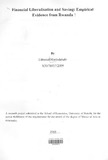Financial Liberalisation and Saving: Empirical Evidence from Rwanda

View/
Date
2010Author
Murindahabi, Edmond
Type
ThesisLanguage
enMetadata
Show full item recordAbstract
In the last two decades, Rwanda has liberalized its financial sector through different programs to reduce the financial repression and encourage market determined prices of financial services especially interest rates. The shared belief was that higher real interest rates lead to higher volume of domestic savings and, given this supply-side effect, private investment would increase and set in a virtuous circle of higher growth and more savings for investment. Whether financial liberalisation has impacted positively savings in Rwanda is an empirical issue.
In this study, we estimate a private saving and a financial saving function in Rwanda using a sample for 1970-2008 period. We investigate the effect of financial liberalisation on both equations, especially the effect of real deposit rate on savings. Based on the literature review an inter-temporal choice saving model was developed so as to yield testable hypothesis about the
relationship between savings and its determinants. Using OLS for the first and Engle-Granger
»
two step procedures for the second, the results seems to reject the McKinnon and Shaw hypothesis of positive effect of interest rate on both aggregates. Private saving is driven by growth rate in income and foreign saving while financial saving is a function of real income.
Therefore, policies that spur development are an indirect but effective way to raise savings. Tight fiscal and monetary policies are also required to control inflation.
Publisher
University Of Nairobi
Rights
Attribution-NonCommercial-NoDerivs 3.0 United StatesUsage Rights
http://creativecommons.org/licenses/by-nc-nd/3.0/us/Collections
The following license files are associated with this item:

